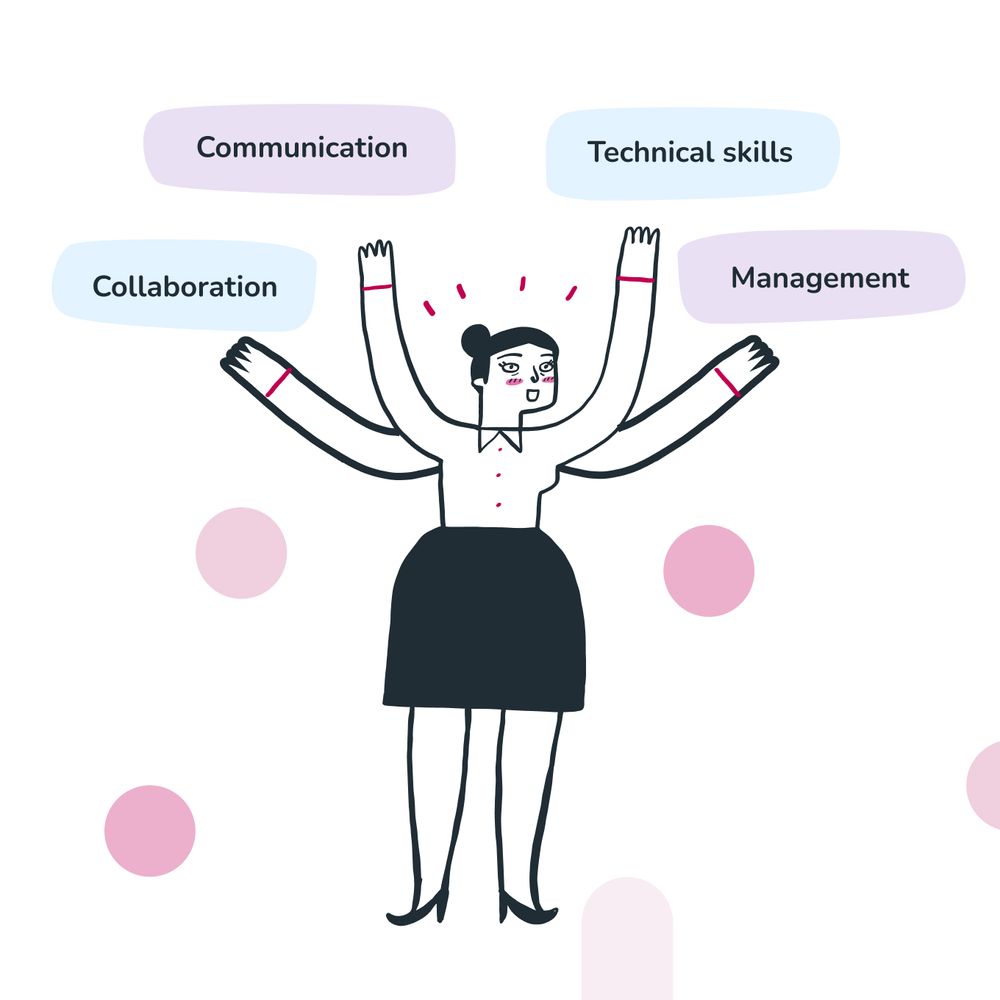Engineering operations is a system of practices that combines software development and IT to increase the speed and efficiency of software delivery. It involves things like automation, continuous integration, and continuous delivery to streamline the software development process and ensure that software is delivered to users quickly, reliably, and with high quality.
Ever since we launched our brave little product, I’ve been getting a lot of different questions in my inbox. Most of them are about what ‘empowerment’ means for software engineers, but there are also a few about engineering operations. So let me dive right in as this one’s a doozy 😂
What Is An Engineering Operations Manager?
An engineering operations manager (aka engineering manager) is someone who understands the role of a software developer and possesses knowledge about the software development process. They also have competencies in the soft side of building technology like knowing how to navigate different personality types, knowing how engineers learn, and knowing how to encourage engagement among software developers.
Because building software is a creative, sustained, people process, it’s the engineering manager’s responsibility that dev teams communicate and collaborate well. If not, the process of building, testing, and deploying software gets compromised.
What Traits Does an Engineering Manager Usually Have?
- High technical proficiency, with experience in both development and operations
- Excellent communication and interpersonal skills
- Experience in project management and execution
- Understands agile methodologies
- Knows how to create systems (organization chart, market strategies, coordination plans, communications protocols, etc)
- Knows how to implement programs (onboarding, mentorship, tech talks, hackathons, community events, conference appearances, paired programming)
- Strong problem-solving and analytical skills
- Ability to keep up with industry trends and developments to stay ahead of the curve in engineering operations
- Good engineering leadership skills to provide dev teams with the ultimate ‘Why’ and help them achieve their goals
Are Engineering Managers the Same as Engineering Operations Managers?
They pretty much are. The most common duty they share is balancing technical and managerial duties. Also, engineering managers need to make sure that their developers 1) know how to solve problems and 2) know how to solve problems efficiently.
How Has Covid-19 and Remote Work Affected Software Development?
Because retention is a key metric for engineering managers, they also have to find ways to help their engineers grow so they won’t leave. One way is by giving them more opportunities to work on side projects.
They also need to know if their developers are engaged and motivated. How? By gauging their feelings and thoughts about projects using pulse surveys. Such tools can also explore factors related to burnout and assess the reasons behind low retention/high turnover.
Why Are Engineering Managers Important?
If your organization is growing, chances are your engineering team might have to expand too. With this growth comes a new set of challenges that can undermine productivity. If this is ignored, then deliverables are slowed and deployment is halted. Morale takes a nose dive and company culture simply becomes a trendy hashtag and nothing more.
Without anybody dedicated to managing this growth, implementing new systems and processes, coordinating knowledge transfers, onboarding new engineers, and keeping engineers happy and engaged, the organization can suffer tremendously.
Scaling requires a clear direction and a reevaluation of current goals and objectives for engineering teams. In this absence, an overworked senior may step in with an improvised plan, so the supposed solution can become just another problem. Dev teams may be left not knowing what they are supposed to be working on or how their work fits into the larger picture.
Also, lack of coordination. Engineering projects often require open intra- and inter-team communication and a great deal of collaboration with other departments, such as product management and design. Without an engineering manager, there may not be anyone to facilitate this coordination, leading to miscommunications, delays, and missed opportunities. For example, as the engineering team grows, responsibilities can be further divided. But how would you know who to go to if you want to solve a specific problem that you’re unable to solve?
That’s where an engineering manager steps in. He or she establishes an organizational system for project accountability. He or she also creates a clear set of boundaries within which engineers can work autonomously. Having these boundaries also simplifies the process of assigning urgency to problems, which can then determine what’s investigated first or not. The reporting chain constantly needs to be updated as an engineering team scales, and this fall under the engineering manager.
What Are the Different Areas of Engineering Operations?
Setting Engineering Role Definitions and Performance Standards
It’s important for every engineering manager to define engineering roles, levels, and expectations. This involves establishing a clear set of responsibilities that every engineer in your organization must fulfill.
Doing so has a twofold benefit - it helps to effectively coach and develop your engineering staff, and also aids in recruiting the right candidates. With software development becoming a job that can be done remotely, being clear on day one will help developers know exactly what their tasks are and how they can achieve their goals.
At the end of the day, if everyone “knows their role” or “stays in their lane” then the chance for friction between teammates is also reduced, thus making them more productive and on point with their tasks.
Implementing an Effective Hiring Framework for Engineers
Developing an effective engineering hiring and interview process is one of the key areas in engineering operations. It requires putting a system in place to ensure that the candidate hired is the best fit for the job and will be a positive contribution to the organization's culture, values, and goals.
The engineering manager is tasked with evaluating candidates and ensuring that candidates come away with a positive experience and impression of the company despite the outcome. A successful recruitment process helps to build a talented and diverse workforce that contributes to the organization’s success.
Implementing Tools and Processes for Optimal Performance
To implement tools and processes in engineering operations, you should start by identifying the areas that need improvement or optimization. Once you've done that, research and evaluate the available tools and processes that can address those areas.
There are many tools and processes used in software development. Some examples include version control systems (such as Git), integrated development environments (IDEs) like IntelliJ, project management tools (such as Jira), automated testing frameworks (such as Selenium), continuous integration and deployment (CI/CD) pipelines (such as Jenkins), code review tools (such as GitHub), and collaboration platforms (such as Slack).
Agile methodologies (such as Scrum or Kanban) and DevOps practices (such as infrastructure as code) are popular approaches to software development that involve a combination of tools and processes.
Select the ones that best fit your organization's needs and goals, and then plan and design the implementation process.
Communication is also key during implementing tools and processes, so make sure to involve all stakeholders to get buy-in and support. Your next step is to train your developers on how to use the new tools and processes effectively and monitor their effectiveness to make improvements and little tweaks where needed.
Building a High-Performance Engineering Team Through Planning and Efficient Execution
To improve engineering planning and execution speed, you need to have a clear understanding of your organization's goals and objectives. Start by defining a set of milestones and deliverables that align with these goals. Break these down into smaller, more manageable tasks and prioritize them based on their impact and dependencies. Assign these tasks to the appropriate teams and individuals, and ensure that everyone is aware of their responsibilities and deadlines. By establishing a clear roadmap and executing it efficiently, you can ensure that your engineering organization is meeting its goals and delivering value to your customers.
The Importance of Building Community Engagement as a New Engineering Manager
As a software engineering manager, organizing and contributing to community events like tech talks, either online or in the physical world, are important for networking and brand-building. This might take up a lot of time, so you might have to outsource some help to one of your direct reports.
To consider a conference a success, you need to coordinate with potential speakers or presenters and ensure the logistics of the event are taken care of. This is generally much easier if you do it online. However, it might be a bit boring if you don’t use virtual platforms or at least try to replicate the real conference experience.
Also, it's important to promote the event to a wider audience. You can do this through various channels such as social media, email newsletters, or even word of mouth. Wait up! There’s more! It's also important to follow up after the event with attendees, speakers, and sponsors to gather feedback, measure success, and plan for future events. By participating in community events, software engineering managers can help build their organization's brand and reputation, and foster a culture of learning and collaboration within their team.
Engineering operations is an important area for engineering managers to shine in. Why? Because their effectiveness at creating tools and processes that enable their dev teams to solve the right problems has a direct impact on company growth. It’s definitely worth hiring one to make things run smoother throughout software development!





